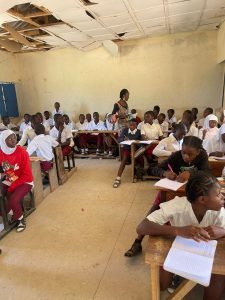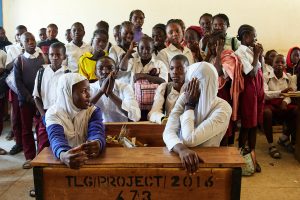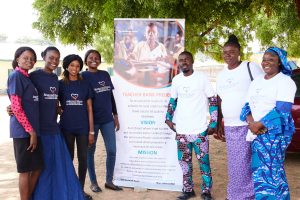By Shereefdeen Ahmad

It was a Monday morning, Caleb Nnaecheta sat inside a bustling classroom together with other students, waiting for his Mathematics teacher. That day, after receiving a two-hour lesson for the subject, the next time he set his eyes on that teacher was another Monday.
Nnaecheta has a similar story to tell about his English Language teacher. And why educational atmosphere has become unconducive for him, forcing the 17-year-old Senior Secondary School (SSS3) student to nurture the thought of switching from Government Day Secondary School at New Bwari, Tafa Local Government Area of Niger State to another school elsewhere.
“Yes, I considered leaving the school but there is no money to go to a better school,” he said. “Because for a whole week, we only receive two hours of lessons each for mathematics and English language.”
“The school did not have enough teachers to handle the subjects. Most of the teachers there were doing teaching practice and one teacher could be handling multiple subjects.”
And this has taken a huge toll on Nnaecheta’s academic performances, leaving him with a slim knowledge of Mathematics and English language.
Inadequate teachers is highlighted as a major impediment to achieving quality education. In Sub-Saharan Africa – the region with the fastest growing school-age population in Africa – more than 70% of countries face teacher shortage in primary schools, while 90% do not have enough secondary teachers, according to United Nations Educational, Scientific and Cultural Organization, (UNESCO).
Also, Nigeria had a shortage of 277, 537 teachers at the basic level, according to the 2018 National Personnel Audit (NPA) conducted on Public and Private Basic Education Schools in the country by the Universal Basic Education (UBEC).
The report stated that there was a shortage of 135, 319 teachers at the pre-primary school level, 139, 772 at the primary level and 2,146 at the Junior Secondary School level across the country.
The NPA report further indicated that while 73 per cent of those teaching in public schools were qualified teachers, only 53 per cent of teachers in private schools were qualified to teach.
“It’s important to look at the shortage of teachers and correct it so that we would be able to produce graduates whose education can meet up with their peers among comity nations,”said Olasupo Abideen Opeyemi, the Global Director of Brain Builders Youth Development Initiative(BBYDI), a non-governmental organization that advocates for good governance, transparency, and accountability in Nigeria.
“Because this is seriously affecting the standard of education and as well contributing to the number of out-of-school children in Nigeria. It also contributes to the idea of producing graduates that are not marketable. If the input is not of good quality, there can never be good output.”
Filling the Gap
As shortage of teachers continues to be a bane on access to quality education in Nigeria, particularly in underserved communities, Restored Heart Foundation(RHF), a non-governmental organization established to create a haven for teenagers and young adults, began providing teachers to underserved communities in Nigeria.

Launched in February 2022, the RHF, through its Teachers Bank Project has been providing extra teachers to schools in rural communities for a period of one year, in order to support the day-to-day academic activities.
The Abuja-based organization takes the responsibility of recruiting teachers for junior and senior secondary schools in Nigeria’s underserved communities in partnership with the National Youth Service Corps (NYSC) and some qualified graduates within the host communities.
Government Day Secondary School, New Bwari under Tafa Local Government Area of Niger State was the first to benefit. The project kicked off with them as one of the schools in dire need of teachers, especially for core subjects like Mathematics and English Language.
Ebuka Alumona, RHF’s Programmes Manager, explained that “the school has a student population of about 580 as of the time we visited the school in June 2022 and only nine teachers including the school principal.”
He said after a thorough needs assessment by the organization, a total of nine teachers were recruited to support the school with focus on two subjects: English Language and Mathematics.
“Ever since the intervention of RHF, things have greatly improved in our school,”Praise Falana, another SSS3 student said. “We now receive lessons for Mathematics and English Language at least four times in a week for each of the subjects.”
He told this reporter how his organisation get support. According to Alumona, RHF gets funded through public donations, partnership and grants.
Aside from providing the students with necessary reading materials like textbooks, RHF also placed the recruited teachers on monthly stipends, he pinpointed.
RHF: Saving Nigeria of increasing unemployment burdens
Like everyone else, Rita Awyetu Ballard, 29, had hunted for a source of livelihood after graduation. However, the saturated labor market of Nigeria made it seemingly impossible. Yes, she was ignored for eight solid months.
This resident of New Bwari community kept her hopes alive, searching and praying to lay her hand on what she could call her own job. It was on this journey that she came across Restored Heart Foundation’s call for application to its Teachers Bank Project fellowship.

She applied, and after a thorough screening process by the organization, Ballard told this reporter what a handshake with luck means to her. She was selected for the Fellowship – as an English language teacher in the Government Day Secondary School, New Bwari.
“The Restored Heart Foundation Fellowship has given me a job with a new family to work with,” Rita Awyetu Ballard said.
Before Ballard’s admission to the Teachers Bank Project – together with eight other fellows – she was among the 23 millions unemployed Nigerians in 2022, as contained in areport by Jobberman in collaboration with Young Africa Works and Mastercard Foundation.
According to Statista , Nigeria’s unemployment rate in 2022 was estimated to reach 33 percent. This figure was projected to be 32.5 percent in 2021. And in the fourth quarter of 2020, over 33 percent of the labor force was unemployed.
Meanwhile, the Nigerian Economic Summit Group (NESG), a private sector-led think-tank has projected that the country’s unemployment rate will hit 37 per cent in 2023.
The group said that due to weak performance in the job-elastic sectors, and low labor absorption of sectors that will drive growth, the nation’s population growth estimated at 3.2 percent will lead to a decline in real per capita income; noting that the Nigeria’s poverty headcount will also rise to 45 per cent.
The chronological data shows that Nigeria’s unemployment rate is always at an increasing trend.
But for RHF, after Government Day Secondary School at New Bwari, more teachers would be recruited in its target for another school in the state.
However, this organization’s impacts in curbing unemployment and tackling the effects of shortage of teachers was never without some challenges and limitations. One of them is the lack of adequate technology skills on the part of the Teacher Bank Project fellows.
Another challenge encountered is lack of libraries to facilitate deeper learning and research in most schools, Alumona told Tribune Online.
“More teachers still needed to cascade learning and we also face financial issues in terms of providing the students with necessary reading materials,” RHF’s Programme manager quipped.
As an education expert, Olasupo Abideen Opeyemi believed shortage of teachers means education does not matter. But to him, the government’s change in attitude that encourages teaching with incentives has a viagra for our quality education.
“Teachers are the nation’s builders. The foundation of every student is dependent on the quality of teachers. That’s the reason we should not pay leap service to it. When we’ve shortage of teachers, we are indirectly saying education does not really matter to us as a country. We need to equip the teachers with adequate 21st-century training and give them teaching pedagogy in conformity and pay them well,” Olasupo opined.
He added that, “the government should encourage teaching volunteers(worthy of good character). They should provide more incentives to encourage more people to join the teaching profession.”
